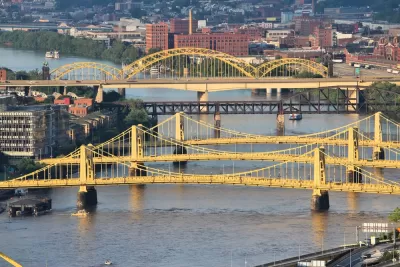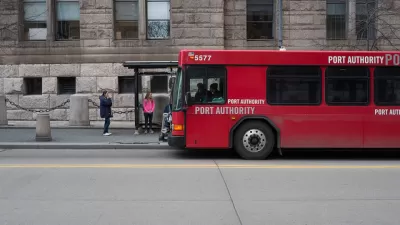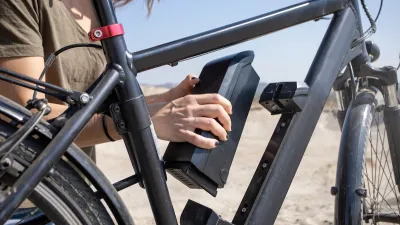The collective of micromobility and shared mobility operators is tasked with developing an integrated system that would better serve the diverse needs of travelers.

Laura Bliss reports on the Pittsburgh Mobility Collective, a consortium of mobility service providers that is working to provide multiple services through one platform. Participants include Spin, Zipcar, Ford Mobility, Waze, Swiftmile, and the Transit app.
Pittsburgh’s transportation department had issued a request for plans that would provide car-free travel alternatives:
[The Mobility Collective’s] winning plan, which was one of five submissions, envisions "mobility hubs" clustered near transit stops throughout Pittsburgh. There, travelers would find some combination of bike-share stations, Zipcar vehicles, Waze carpool pickup spots, and parked and charged e-bikes and scooters from Spin to rent. The Transit app would handle route planning and ticketing services to customers, and Ford Mobility would feed data analytics back to the city.
Bliss reports that the project is bringing together companies that in most other contexts operate as competitors. But Pittsburgh officials particularly wanted bundle services for travelers who might face challenges accessing and using existing individual services.
The city is offering the participating companies some incentives, reports Bliss. "For one, the city is keeping other mobility competitors out of play for the time being, according to [Karina] Ricks. And two, her department will work closely with the collective to remove obstacles to their success on the street."
FULL STORY: A Micromobility Experiment in Pittsburgh Aims to Get People Out of Their Cars

Alabama: Trump Terminates Settlements for Black Communities Harmed By Raw Sewage
Trump deemed the landmark civil rights agreement “illegal DEI and environmental justice policy.”

Planetizen Federal Action Tracker
A weekly monitor of how Trump’s orders and actions are impacting planners and planning in America.

The 120 Year Old Tiny Home Villages That Sheltered San Francisco’s Earthquake Refugees
More than a century ago, San Francisco mobilized to house thousands of residents displaced by the 1906 earthquake. Could their strategy offer a model for the present?

In Both Crashes and Crime, Public Transportation is Far Safer than Driving
Contrary to popular assumptions, public transportation has far lower crash and crime rates than automobile travel. For safer communities, improve and encourage transit travel.

Report: Zoning Reforms Should Complement Nashville’s Ambitious Transit Plan
Without reform, restrictive zoning codes will limit the impact of the city’s planned transit expansion and could exclude some of the residents who depend on transit the most.

Judge Orders Release of Frozen IRA, IIJA Funding
The decision is a victory for environmental groups who charged that freezing funds for critical infrastructure and disaster response programs caused “real and irreparable harm” to communities.
Urban Design for Planners 1: Software Tools
This six-course series explores essential urban design concepts using open source software and equips planners with the tools they need to participate fully in the urban design process.
Planning for Universal Design
Learn the tools for implementing Universal Design in planning regulations.
Clanton & Associates, Inc.
Jessamine County Fiscal Court
Institute for Housing and Urban Development Studies (IHS)
City of Grandview
Harvard GSD Executive Education
Toledo-Lucas County Plan Commissions
Salt Lake City
NYU Wagner Graduate School of Public Service





























